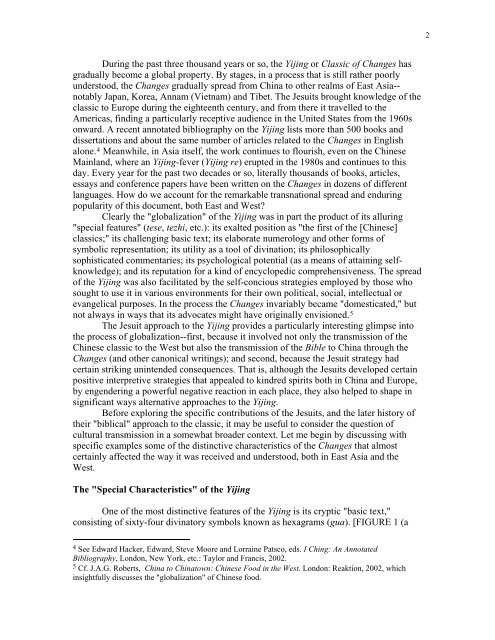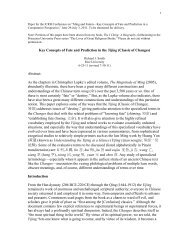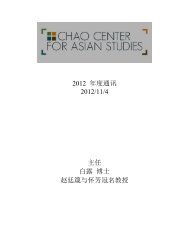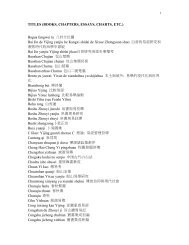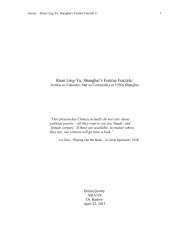Jesuit Interpretations of the Yijing - Chao Center for Asian Studies ...
Jesuit Interpretations of the Yijing - Chao Center for Asian Studies ...
Jesuit Interpretations of the Yijing - Chao Center for Asian Studies ...
You also want an ePaper? Increase the reach of your titles
YUMPU automatically turns print PDFs into web optimized ePapers that Google loves.
2<br />
During <strong>the</strong> past three thousand years or so, <strong>the</strong> <strong>Yijing</strong> or Classic <strong>of</strong> Changes has<br />
gradually become a global property. By stages, in a process that is still ra<strong>the</strong>r poorly<br />
understood, <strong>the</strong> Changes gradually spread from China to o<strong>the</strong>r realms <strong>of</strong> East Asia--<br />
notably Japan, Korea, Annam (Vietnam) and Tibet. The <strong>Jesuit</strong>s brought knowledge <strong>of</strong> <strong>the</strong><br />
classic to Europe during <strong>the</strong> eighteenth century, and from <strong>the</strong>re it travelled to <strong>the</strong><br />
Americas, finding a particularly receptive audience in <strong>the</strong> United States from <strong>the</strong> 1960s<br />
onward. A recent annotated bibliography on <strong>the</strong> <strong>Yijing</strong> lists more than 500 books and<br />
dissertations and about <strong>the</strong> same number <strong>of</strong> articles related to <strong>the</strong> Changes in English<br />
alone. 4 Meanwhile, in Asia itself, <strong>the</strong> work continues to flourish, even on <strong>the</strong> Chinese<br />
Mainland, where an <strong>Yijing</strong>-fever (<strong>Yijing</strong> re) erupted in <strong>the</strong> 1980s and continues to this<br />
day. Every year <strong>for</strong> <strong>the</strong> past two decades or so, literally thousands <strong>of</strong> books, articles,<br />
essays and conference papers have been written on <strong>the</strong> Changes in dozens <strong>of</strong> different<br />
languages. How do we account <strong>for</strong> <strong>the</strong> remarkable transnational spread and enduring<br />
popularity <strong>of</strong> this document, both East and West<br />
Clearly <strong>the</strong> "globalization" <strong>of</strong> <strong>the</strong> <strong>Yijing</strong> was in part <strong>the</strong> product <strong>of</strong> its alluring<br />
"special features" (tese, tezhi, etc.): its exalted position as "<strong>the</strong> first <strong>of</strong> <strong>the</strong> [Chinese]<br />
classics;" its challenging basic text; its elaborate numerology and o<strong>the</strong>r <strong>for</strong>ms <strong>of</strong><br />
symbolic representation; its utility as a tool <strong>of</strong> divination; its philosophically<br />
sophisticated commentaries; its psychological potential (as a means <strong>of</strong> attaining selfknowledge);<br />
and its reputation <strong>for</strong> a kind <strong>of</strong> encyclopedic comprehensiveness. The spread<br />
<strong>of</strong> <strong>the</strong> <strong>Yijing</strong> was also facilitated by <strong>the</strong> self-concious strategies employed by those who<br />
sought to use it in various environments <strong>for</strong> <strong>the</strong>ir own political, social, intellectual or<br />
evangelical purposes. In <strong>the</strong> process <strong>the</strong> Changes invariably became "domesticated," but<br />
not always in ways that its advocates might have originally envisioned. 5<br />
The <strong>Jesuit</strong> approach to <strong>the</strong> <strong>Yijing</strong> provides a particularly interesting glimpse into<br />
<strong>the</strong> process <strong>of</strong> globalization--first, because it involved not only <strong>the</strong> transmission <strong>of</strong> <strong>the</strong><br />
Chinese classic to <strong>the</strong> West but also <strong>the</strong> transmission <strong>of</strong> <strong>the</strong> Bible to China through <strong>the</strong><br />
Changes (and o<strong>the</strong>r canonical writings); and second, because <strong>the</strong> <strong>Jesuit</strong> strategy had<br />
certain striking unintended consequences. That is, although <strong>the</strong> <strong>Jesuit</strong>s developed certain<br />
positive interpretive strategies that appealed to kindred spirits both in China and Europe,<br />
by engendering a powerful negative reaction in each place, <strong>the</strong>y also helped to shape in<br />
significant ways alternative approaches to <strong>the</strong> <strong>Yijing</strong>.<br />
Be<strong>for</strong>e exploring <strong>the</strong> specific contributions <strong>of</strong> <strong>the</strong> <strong>Jesuit</strong>s, and <strong>the</strong> later history <strong>of</strong><br />
<strong>the</strong>ir "biblical" approach to <strong>the</strong> classic, it may be useful to consider <strong>the</strong> question <strong>of</strong><br />
cultural transmission in a somewhat broader context. Let me begin by discussing with<br />
specific examples some <strong>of</strong> <strong>the</strong> distinctive characteristics <strong>of</strong> <strong>the</strong> Changes that almost<br />
certainly affected <strong>the</strong> way it was received and understood, both in East Asia and <strong>the</strong><br />
West.<br />
The "Special Characteristics" <strong>of</strong> <strong>the</strong> <strong>Yijing</strong><br />
One <strong>of</strong> <strong>the</strong> most distinctive features <strong>of</strong> <strong>the</strong> <strong>Yijing</strong> is its cryptic "basic text,"<br />
consisting <strong>of</strong> sixty-four divinatory symbols known as hexagrams (gua). [FIGURE 1 (a<br />
4 See Edward Hacker, Edward, Steve Moore and Lorraine Patsco, eds. I Ching: An Annotated<br />
Bibliography, London, New York, etc.: Taylor and Francis, 2002.<br />
5 Cf. J.A.G. Roberts, China to Chinatown: Chinese Food in <strong>the</strong> West. London: Reaktion, 2002, which<br />
insightfully discusses <strong>the</strong> "globalization" <strong>of</strong> Chinese food.


